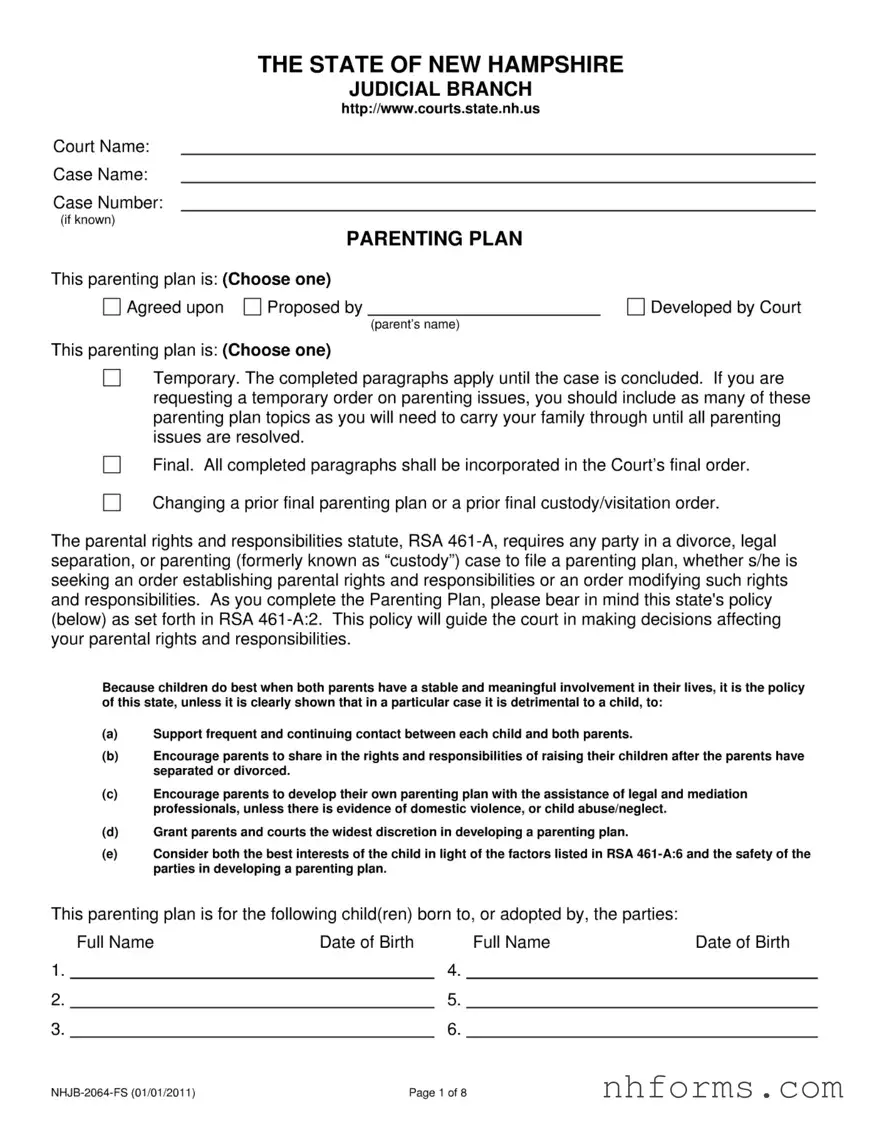Nhjb 2064 Template
The NHJB-2064 form stands as a critical document in various legal proceedings, serving multiple functions that assist both legal professionals and citizens navigating the judicial system. Used predominantly within the state of New Hampshire, this form facilitates the structured and standardized collection of necessary information, ensuring that proceedings are conducted smoothly and efficiently. From filing complaints to submitting requests, the versatility of the NHJB-2064 form makes it an indispensable tool in ensuring that legal processes are accessible and comprehensible. Compliance with this form's requirements promotes a transparent and orderly workflow within the legal framework, emphasizing its significance in maintaining the integrity of the judicial process. The intricacies of completing this form correctly highlight the importance of attention to detail, reinforcing the balance between thoroughness and clarity in legal documentation.
Document Preview Example
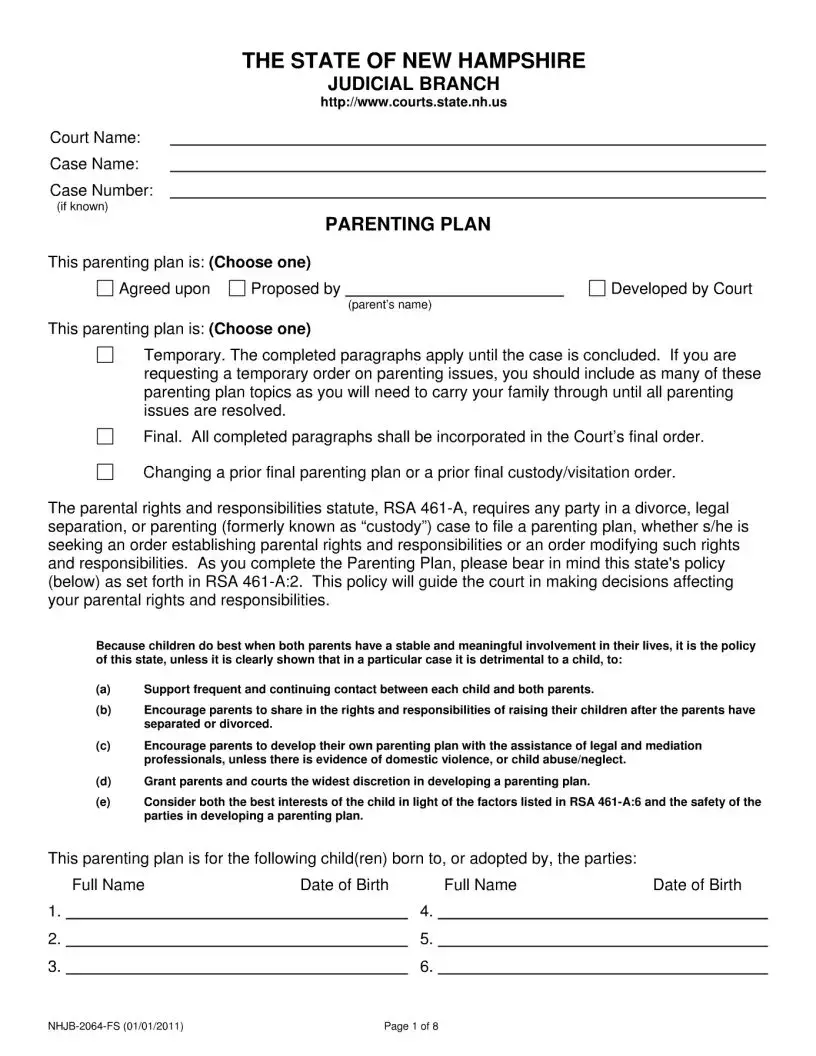
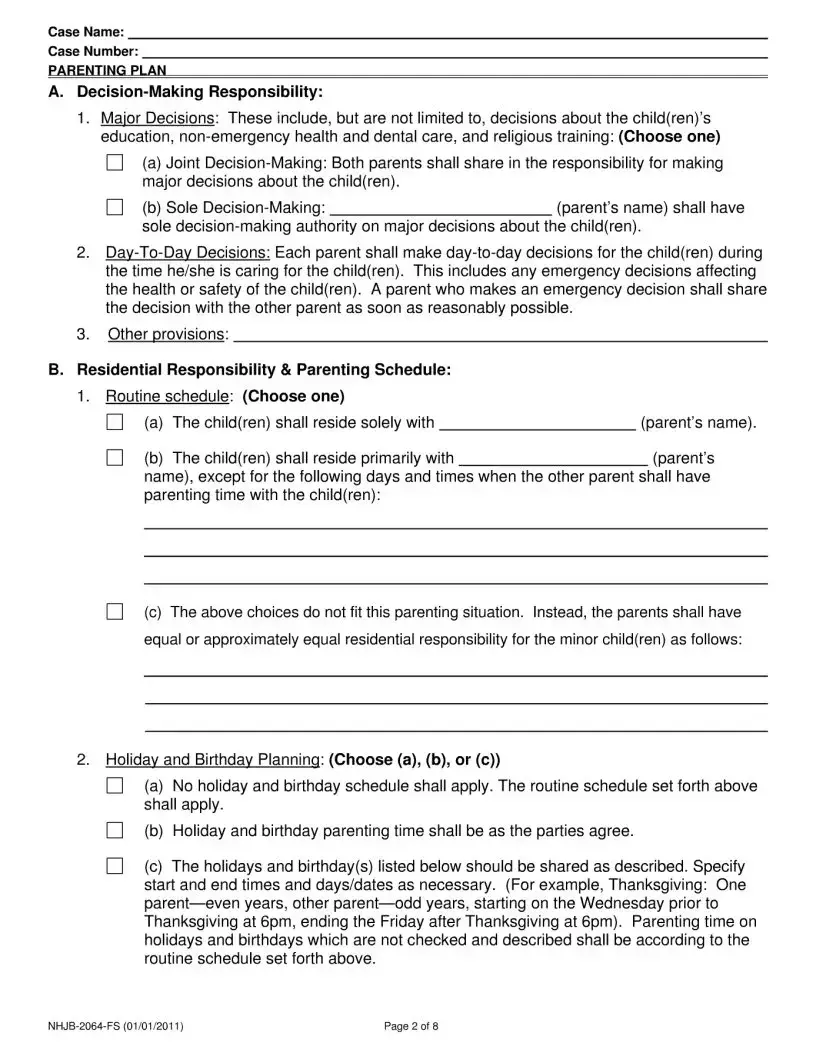
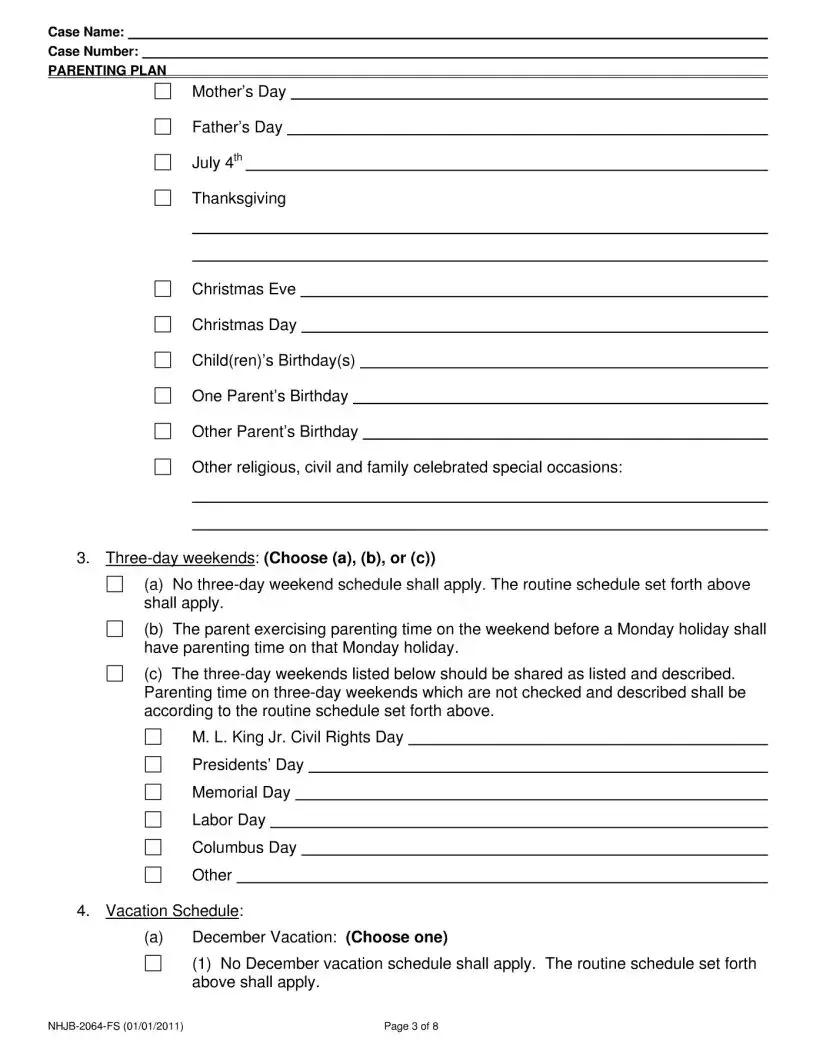
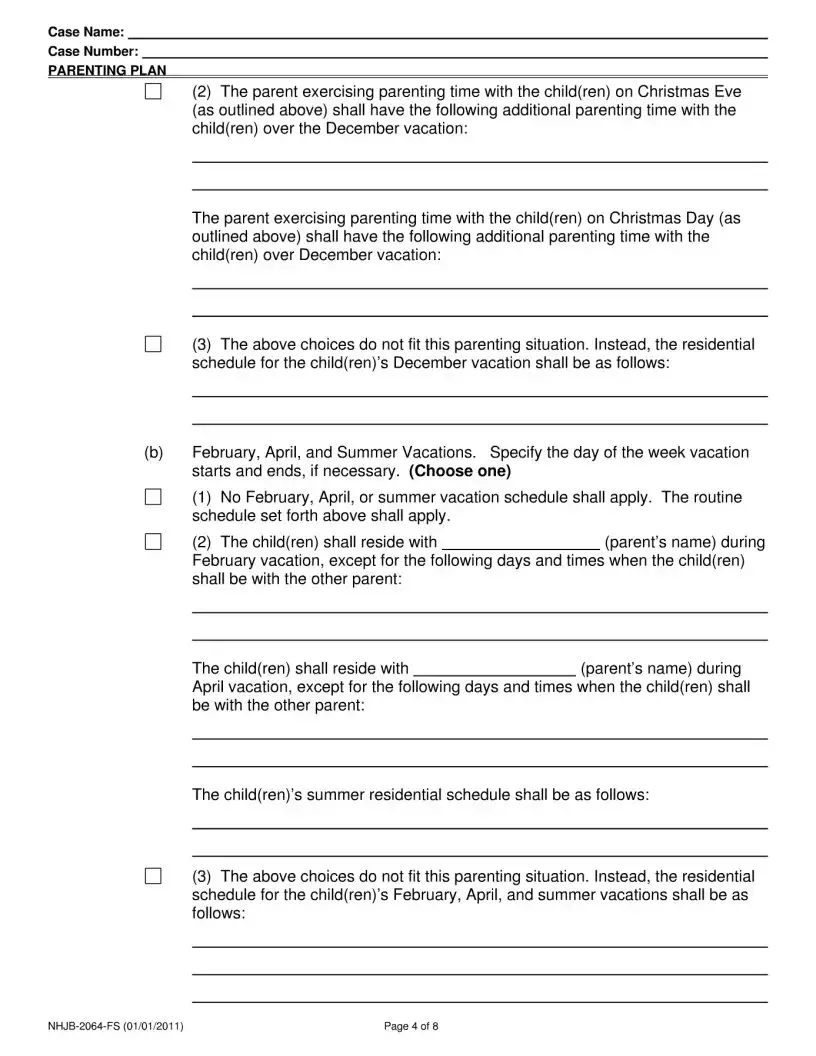
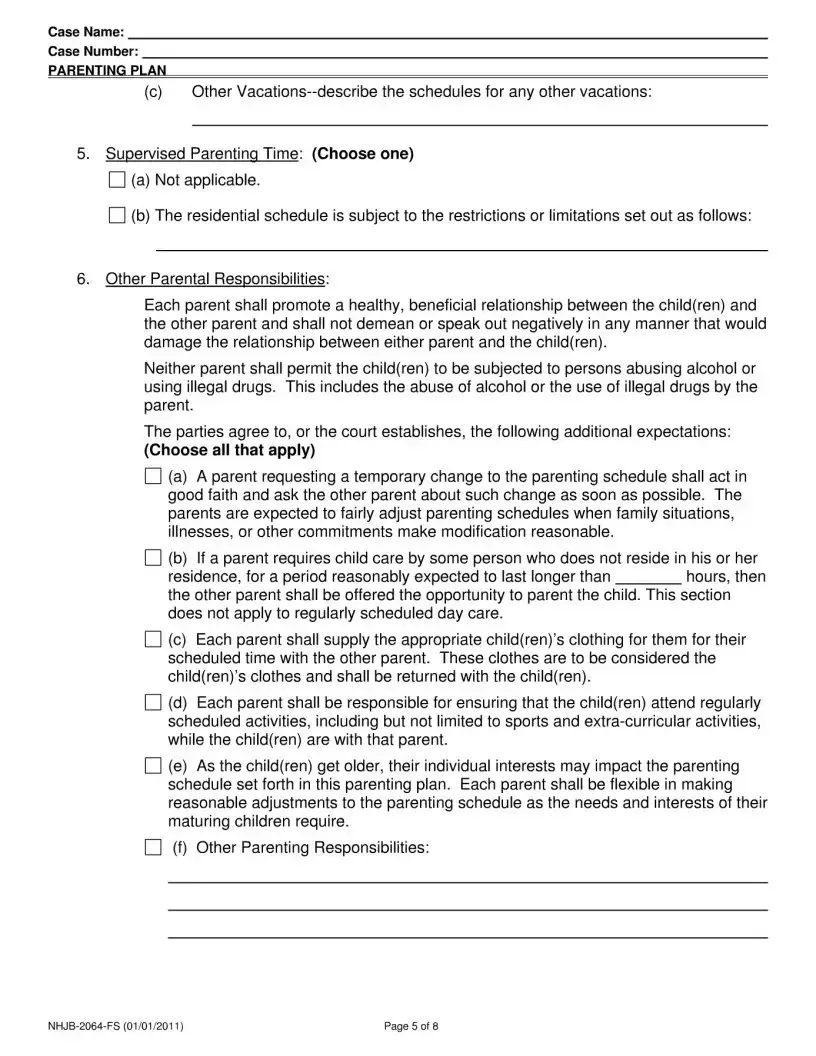
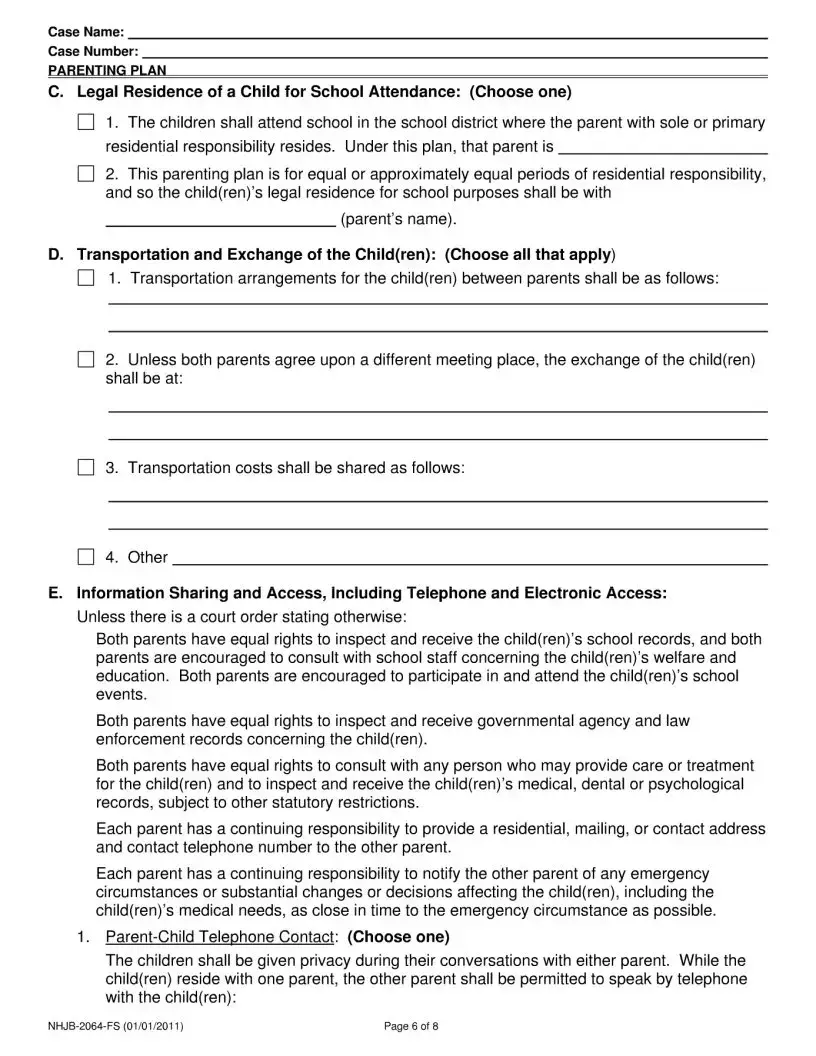
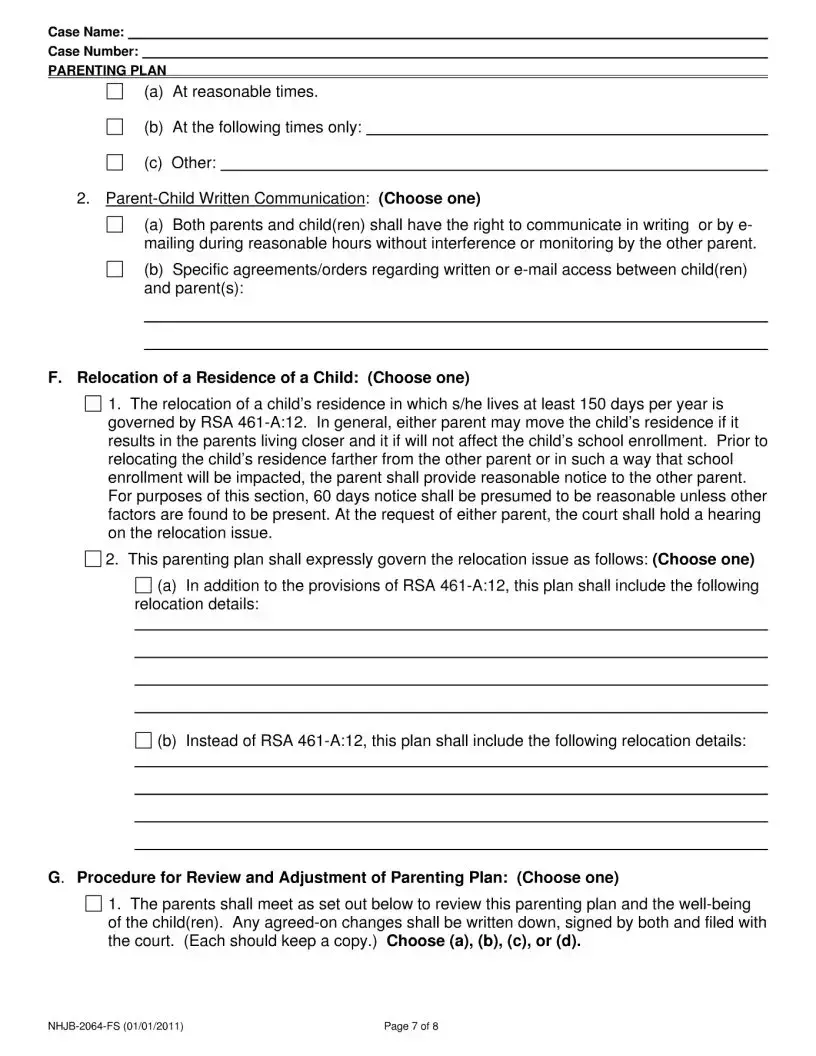
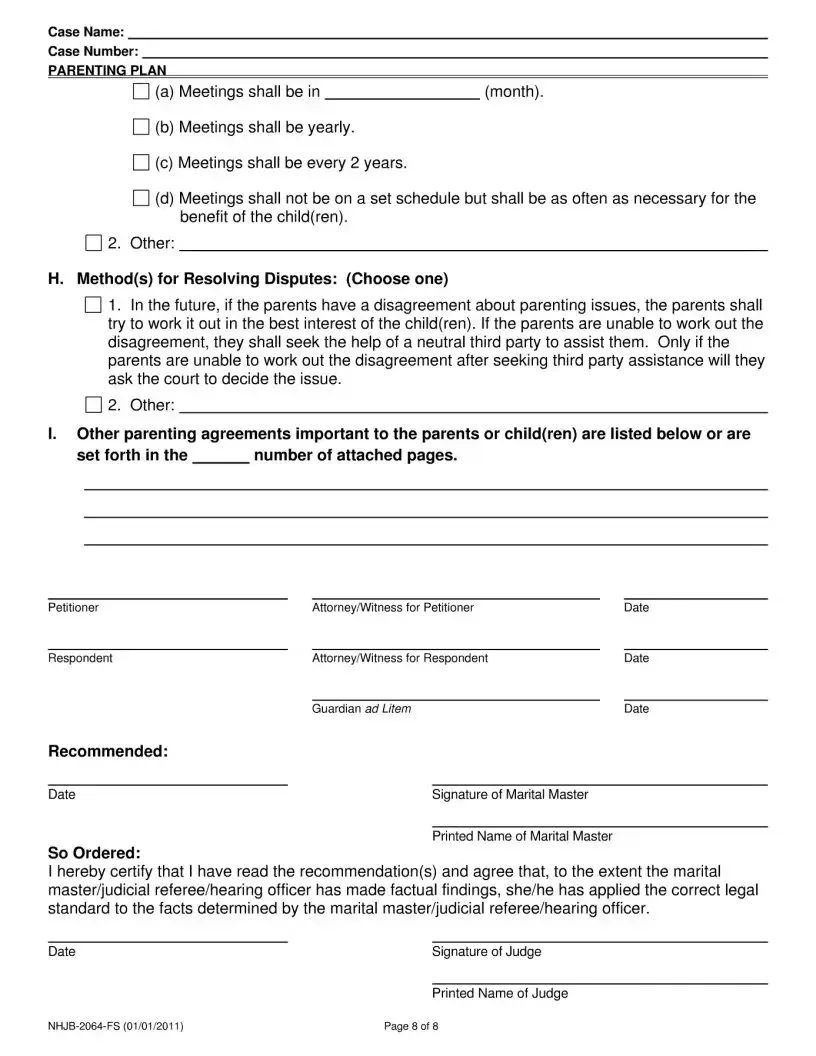
Document Breakdown
| Fact | Detail |
|---|---|
| Form Name | NHJB-2064 |
| Purpose | Used for filing a small claim in the state of New Hampshire |
| Governing Law | New Hampshire Revised Statutes |
| Who Files It? | Individuals seeking to resolve disputes involving a small amount of money, typically not exceeding a set limit defined by state law |
Detailed Instructions for Writing Nhjb 2064
After completing the NHJB 2064 form, the next steps involve ensuring all information is accurate and complete before submitting it to the appropriate legal authorities. This document is crucial for the matter at hand and requires careful attention to detail. The submission process usually involves mailing or delivering the form in person, depending on the instructions provided by the respective court or legal entity. It's important to keep a copy of the completed form for your records.
- Begin by entering the full legal name of the person filling out the form in the designated space at the top.
- Provide the complete address, including street, city, state, and zip code, in the corresponding section.
- Fill in the contact number, making sure to include the area code.
- If applicable, enter the email address to ensure further communication can be easily facilitated.
- In the section provided, detail the case name or title as per legal documents.
- Insert the case number accurately in the space allocated for it.
- Depending on the particular instructions or requirements of the form, additional specific information may need to be included. Read each section carefully to determine what is necessary.
- Review the entire form to ensure all entered information is correct and complete. Errors or omissions can lead to processing delays.
- Sign and date the form in the designated area. This step is crucial as it validates the form.
- Follow the instructions for submission, which typically involve mailing or personally delivering the form to the appropriate office or court.
Remember, filling out the form accurately and in its entirety is imperative for the matter to be processed without unnecessary delay. Double-check everything before making the final submission. Additionally, the instructions for submitting the form should be followed precisely as outlined by the court or legal entity.
Essential Queries on Nhjb 2064
What is the NHJB-2064 form used for?
The NHJB-2066 form, known as the Petition for Change of Name form, is utilized by individuals seeking to legally change their name in the state of New Hampshire. This form starts the process by asking for current personal details, the new name desired, and the reasons for the request.
Where can I obtain the NHJB-2064 form?
One can download the NHJB-2064 form from the New Hampshire Judicial Branch website. Additionally, local court offices often have copies available for pick-up.
How do I submit the completed NHJB-2064 form?
After filling out the form, submit it to the probate court in the county where you reside. It's important to sign the form in front of a notary public before submission. A filing fee will be required at the time of submission.
Are there any attachments I need to include with the NHJB-2064 form?
Yes, depending on your circumstances, you may need to attach additional documents. This could include a copy of your birth certificate, marriage certificate, or other legal documents that support your name change. Additionally, proof of publication in a newspaper may be required.
Is there a filing fee for the NHJB-2064 form?
Yes, there is a filing fee required when submitting the NHJB-2064 form. The amount varies by county, so it’s best to contact your local probate court for the current fee.
How long does it take for a name change to be approved?
The processing time for a name change can vary. After filing, there may be a waiting period before a hearing date is scheduled. Once the judge approves the name change, it can take several weeks for the new name to be legally recognized.
Will I have to appear in court?
In most cases, individuals requesting a name change will need to appear in court. This allows the judge to ask any questions and ensure the change is not for fraudulent purposes. However, specific circumstances might not require a court appearance.
How will I know if my name change is approved?
Once the judge approves your name change, the court will issue a decree of change of name. This document is your legal proof of the name change and should be kept in a safe place. It can be used to update your name on social security cards, drivers’ licenses, and other personal records.
What should I do after my name change is legally recognized?
After your name change is approved and you have the decree, you should update your name with various government agencies and companies. Start with the Social Security Administration and the Department of Motor Vehicles, then inform your bank, employer, and other important institutions of your new name.
Common mistakes
Filling out the NHJB 2064 form, a document required for various legal processes in the state of New Hampshire, can often seem straightforward. However, people frequently make mistakes that can delay or complicate their proceedings. Recognizing and avoiding these errors is essential for ensuring the process is as smooth and efficient as possible.
Here are seven common mistakes many people make when completing the NHJB 2064 form:
- Not reading the instructions carefully. Many applicants rush through filling out the form without thoroughly reading the provided instructions. This can lead to misunderstandings about the information required, causing errors or omissions that may necessitate redoing the form.
- Using incorrect personal information. It is easy to make typos or use outdated information when entering personal details. Double-checking all entries against official documents can prevent issues related to identity or contact information.
- Leaving mandatory fields blank. Every field on the NHJB 2064 form is designed for a reason. Skipping sections because they seem irrelevant or because the applicant is unsure of the answer can result in an incomplete application, leading to delays.
- Failing to provide supporting documentation. Certain sections of the form may require additional documents. Failure to attach these can lead to incomplete applications, which might not be processed until all requisite documentation is provided.
- Incorrectly calculating fees. If the form requires payment, an incorrect calculation can either delay processing or result in additional charges. Carefully reviewing the fee schedule and ensuring the correct amount is included is crucial.
- Using an outdated form version. Forms are periodically updated to reflect changes in laws or procedures. Submitting an outdated version of the NHJB 2064 may mean having to fill out the form again, causing delays.
- Forgetting to sign and date the form. An unsigned form is considered incomplete and will not be processed. Ensuring that all required signatures and dates are on the final document is a simple but frequently overlooked step.
Avoiding these common pitfalls requires attention to detail and an understanding of the form’s requirements. Applicants are encouraged to:
- Take the time to read all the instructions provided carefully.
- Review each section of the form thoroughly before and after completing it.
- Ensure all necessary supporting documents are attached before submission.
- Check the date on the form to make sure it is the most current version.
- Review the fee requirements and double-check any calculations.
- Sign and date the form as required.
By meticulously preparing and reviewing the NHJB 2064 form before submission, individuals can avoid common errors that delay the processing of their forms. This careful approach can save time and effort in fulfilling legal requirements in New Hampshire.
Documents used along the form
The NHJB-2064 form, commonly utilized in legal proceedings within New Hampshire, is part of a suite of documents necessary for comprehensive legal actions, specifically within the judiciary system of the state. Often, this form does not stand alone; various other forms and documents accompany it to ensure a thorough and robust legal process. These accompanying documents vary based on the case's nature but typically include forms that supplement or provide additional information required for the legal matter at hand.
- Petition for Name Change (NHJB-2175-F): This form is frequently used alongside the NHJB-2064, especially in cases involving a legal name change. It provides a detailed request for the change, including reasons for the alteration, which the court reviews for approval.
- Financial Affidavit (NHJB-2015-DF): In situations requiring a detailed account of an individual's financial status, the Financial Affidavit is crucial. This document outlines one's financial resources and liabilities, essential in cases of divorce, child support, or any proceeding where financial assessment is necessary.
- Child Support Guidelines Worksheet (NHJB-2101-FS): This document is vital in cases involving child support determination. It helps calculate the support amount based on the parents' income, childcare costs, and other relevant financial factors, ensuring fair and adequate provision for the child's needs.
- Domestic Violence Protective Order (NHJB-2008-DP): For cases involving allegations of domestic violence, this form is instrumental. It allows individuals to request protection from the court, outlining the nature of the abuse and the type of protection sought, whether it be restraining orders or specific prohibitions against the alleged abuser.
- Uniform Support Order (NHJB-2067-F): This form is used to establish, modify, or enforce child or spousal support orders. It serves as an official court order that outlines the specifics of the support arrangement, including payment amounts, frequency, and duration.
Together with the NHJB-2064 form, these documents facilitate a holistic approach to legal proceedings, ensuring that all aspects of a case are thoroughly considered and addressed. Each document plays a critical role in the legal process, providing the court with necessary details that contribute to informed decisions and equitable outcomes. This collection of forms underscores the importance of a comprehensive and detailed legal framework, designed to address the myriad of issues that can arise in judicial matters.
Similar forms
The NHJB 2064 form is similar to other documents that are used in legal and judicial processes, primarily in how they collect and present information required by the courts or related legal entities. Below are examples of documents to which the NHJB 2064 form bears resemblance:
-
The NHJB 2064 form is similar to the Uniform Pretrial Scheduling Order. Both documents serve to structure the timeline and procedures leading up to a trial, gathering necessary information to avoid delays. The key similarity lies in their objective to streamline court proceedings by setting deadlines and expectations early in the process.
-
It also shares similarities with Financial Affidavit Forms used in family law cases. While the specifics of the information collected may differ, both forms are designed to gather detailed personal and financial data from individuals, which is crucial for making informed decisions in legal matters. The emphasis on accurate and comprehensive information collection underlines this similarity.
-
Another document the NHJB 2064 is akin to is the Case Information Statement (CIS) used in civil litigation. Both forms compile crucial case-related information in a standardized format, aiding legal professionals and judges in understanding the nuances of a case. They facilitate the efficient management and resolution of cases by providing a clear picture of the relevant details.
Dos and Don'ts
Filling out legal forms accurately is crucial to ensure a smooth process in any legal situation. The NHJB 2064 form is no exception. To guide you through a seamless experience, here are five things you should do and five things you should avoid when completing the NHJB 2064 form.
What You Should Do:
- Read all the instructions provided with the form carefully before you start filling it out. This ensures you understand the requirements and provide information accurately.
- Use black ink or type your responses if the form permits electronic completion. Black ink is preferred for clarity and legibility for all involved parties and official records.
- Provide truthful and accurate information to the best of your knowledge. Providing false information on a legal form can lead to penalties or legal consequences.
- Review your entries for accuracy and completeness before submitting the form. Double-check every entry to catch and correct any errors.
- If there is space for additional information or comments essential to your situation, do not leave it blank. Use this opportunity to provide details that can aid in understanding your case or needs.
What You Shouldn’t Do:
- Avoid skipping any required fields. If a section does not apply to you, write "N/A" (not applicable) instead of leaving it blank, unless instructed otherwise.
- Do not use correction fluid or tape. Mistakes should be neatly crossed out, and the correct information should be printed nearby. This maintains the integrity of the form.
- Refrain from guessing on dates or details if you're uncertain. It's better to verify the correct information than to risk submitting incorrect data.
- Avoid submitting the form without first making a copy for your records. Having a copy ensures you have a reference in case there are any questions or if the original submission goes astray.
- Do not write outside the designated fields or margin areas, as it may lead to processing delays or errors in document handling. Keep your responses clean and within the provided spaces.
Misconceptions
The NHJB-2064 form, often associated with judicial proceedings in New Hampshire, is surrounded by a variety of misconceptions. Clearing up these misunderstandings is crucial for those navigating the legal system. Here's a breakdown of the common misconceptions:
- It's Only for Criminal Cases: Many people believe the NHJB-2064 form is exclusively used in criminal matters. In reality, this form spans various legal domains, not just criminal cases. It's utilized in both civil and family law cases, among other legal areas.
- Anyone Can File It: There's a misconception that this form can be filed by anyone involved in a legal matter. However, the use of NHJB-2064 is typically restricted to specific parties and under certain conditions. Understanding who can file it is essential.
- No Attorney Needed: Some individuals think they don't need a lawyer to fill out or file the NHJB-2064 form. While it's true that legal representation isn't a requirement, consulting with an attorney can dramatically increase the chances of a favorable outcome.
- It's a One-Size-Fits-All Form: The belief that the NHJB-2064 is a generic form that fits all types of cases is incorrect. Its application varies significantly depending on the case's specifics. Properly completing the form requires a thorough understanding of its relevance to your unique situation.
- Filing It Guarantees a Hearing: Submitting the NHJB-2064 form does not automatically grant a hearing. The decision to hold a hearing is at the discretion of the court, which considers several factors before scheduling one.
- There's No Deadline: The idea that the NHJB-2066 form can be filed at any time during a case is a common mistake. There are often specific deadlines tied to the filing of the form, missing which can have significant implications for your case.
- It Can Be Filed Online Easily: While digital filings are becoming more common, assuming the NHJB-2064 form can be easily filed online without double-checking the local court's requirements might lead to procedural errors. Always verify the accepted methods of filing for your specific jurisdiction.
- It's Only Relevant at the Start of a Case: People often think this form is only pertinent at the beginning of legal proceedings. In truth, the NHJB-2064 form can be relevant at various stages of a case, depending on evolving legal needs and strategy adjustments.
- Corrections Can't Be Made After Filing: A common fear is that once the NHJB-2064 form is filed, no corrections can be made to it. While it's best to ensure accuracy before filing, courts typically allow amendments to be made under certain conditions.
Understanding these misconceptions is vital for anyone dealing with the NHJB-2064 form in New Hampshire's legal system. This insight aims to equip individuals with the knowledge needed to navigate their legal journey more effectively.
Key takeaways
Filling out and using the NHJB 2064 form, which is utilized within specific legal and judicial processes, requires attention to detail and an understanding of its purpose and requirements. Here are key takeaways to assist individuals in accurately completing and effectively using this form.
- Understand the Purpose: Before filling out the NHJB 2064 form, individuals should fully understand its purpose within the judicial process to ensure it is the correct document for their needs.
- Complete All Required Sections: Every section of the NHJB 2064 form must be completed accurately. Incomplete forms may result in delays or rejection of the application.
- Clear and Legible Writing: Information entered into the form should be in clear and legible handwriting or typed text to avoid misunderstandings or processing delays.
- Accuracy is Key: Accuracy of information provided on the NHJB 2064 form is critical. Incorrect information can lead to legal complications or further administrative processes.
- Attachment of Necessary Documentation: If the form requires support by additional documents, these should be attached as specified. Ensuring that all required documentation is included is vital for the form's acceptance and processing.
- Review Before Submission: Individuals should thoroughly review the completed form and attached documents for accuracy and completeness before submission.
- Understand Submission Guidelines: Knowing where and how to submit the NHJB 2064 form is as important as filling it out correctly. Submission guidelines, including deadlines, should be adhered to.
- Keep a Copy: After submission, keeping a copy of the NHJB 2064 form and all accompanying documents is advisable for personal records and future reference.
Different PDF Templates
New Hampshire 2620 - The structured format of the form aids providers in understanding their obligations and the procedural steps necessary for enrollment.
Nh Business Tax - The NH-1065-ES form serves as a vital tool for businesses in planning and submitting their estimated taxes in accordance with New Hampshire regulations.
Nh Probate Court Forms - Designed to facilitate the legal process of establishing guardianship, outlining steps for submission and information about the minor's resident history and family background.
